US Dollar Talking Points:
- The US Dollar found support at the 105.44 level looked at in last week’s webinar around the NFP release on Friday, and that has since helped to drive a bounce in DXY.
- At the time of the webinar EUR/USD was testing 1.0500 support and given the 57.6% clip of the Euro in the DXY quote, that’s a major component to USD price action.
- Tomorrow brings a US CPI print with headline CPI expected to increase to 2.7% annualized from last month’s 2.6% reading, while core is expected to remain flat at 3.3% YoY. And then next week is the FOMC.
- Gold has broken out of the range and is making a push towards next resistance at 2700.
When Donald Trump won his first election in November of 2016, a massive move developed across US markets with both the US Dollar and US equities gaining into the end of the year. But as we came into 2017 trade, even with the Fed taking on a more-hawkish stance and hiking rates three times that year after having only hiked twice since the Financial Collapse, the US Dollar sold off aggressively.
A similar tandem appeared upon the results of the 2024 election, with the US Dollar breaking-out as US equities rallied. The US Dollar continued to spike for a couple of weeks after, eventually tagging the 108.00 level in DXY in late-November which finally prodded some element of pullback.
That pullback ran in a clean fashion until last Friday’s NFP report. At that point, DXY dipped down to the 105.44 level, which has confluence as a prior swing-high (from the initial election breakout) and a prior descending trendline that had held resistance. That spot helped to set the lows last Friday and so far, this week prices have bounced back up to the 106.50-106.88 gap from last November’s FOMC rate meeting.
US Dollar Daily Price Chart
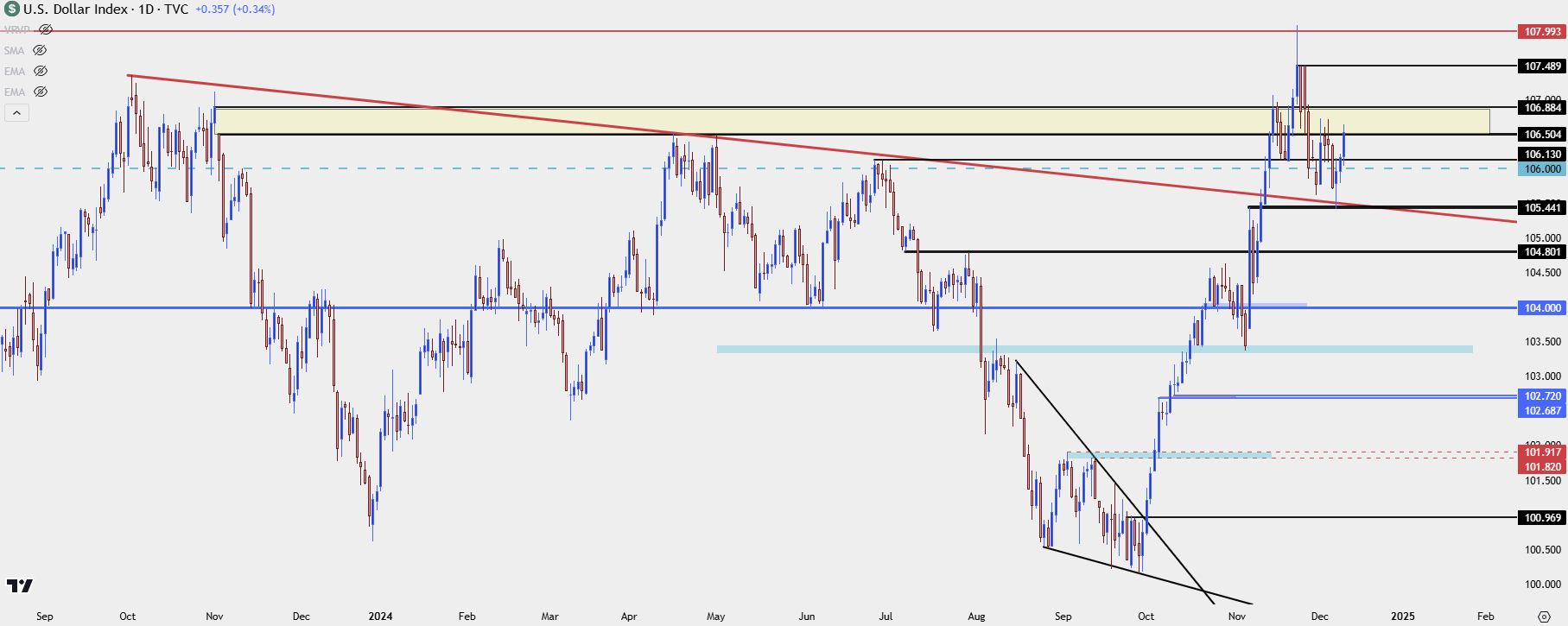 Chart prepared by James Stanley; data derived from Tradingview
Chart prepared by James Stanley; data derived from Tradingview
US Dollar Bigger Picture
From the weekly chart there’s a few additional observations of note. First, the post-election run in 2016 and the responding sell-off in 2017 have been marked with blue and red boxes. But also marked in the purple box was the intense trend in the US Dollar that was pushed by the Fed going hawkish in 2022. That spike in the USD was a negative driver for the US equity market. This seems like something that the Fed would want to avoid if it all possible. And this is something that highlights mean reversion potential for the US Dollar as we move towards the 2025 open.
US Dollar Weekly Chart
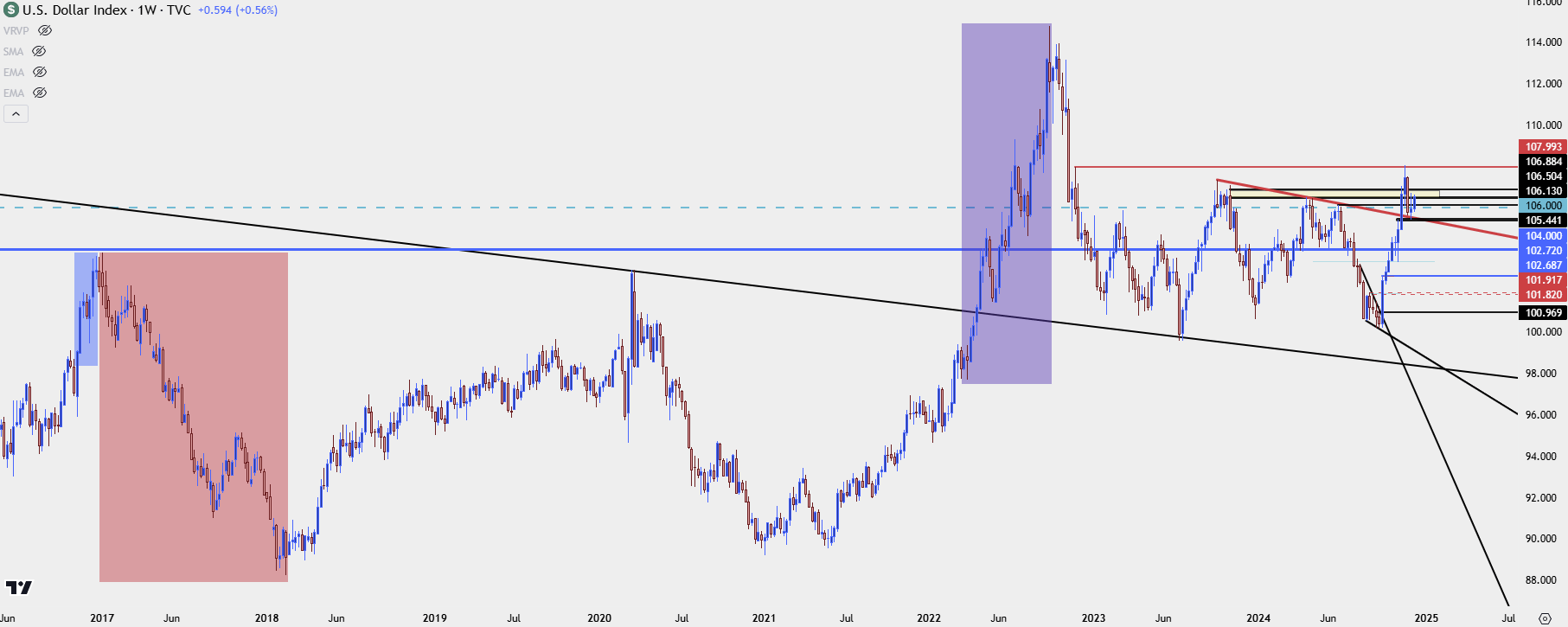 Chart prepared by James Stanley; data derived from Tradingview
Chart prepared by James Stanley; data derived from Tradingview
EUR/USD
The Euro is 57.6% of the DXY quote, so it’s rare to see the US Dollar pose a trend that doesn’t have at least some participation from the Euro. And for the better part of the past two years both markets have shown range-bound tendencies. That’s started to come into question, however, with both markets pushing towards extremes, with USD testing resistance and EUR/USD testing support.
When the USD-spike in 2022 was taking place, equity markets in both the US and Europe were in disarray. It was when the exchange rate settled and moved into a range that matters began to calm for stocks. The two-year-range that built after the pullback from that sell-off had largely remained between the 1.0500 and 1.1200 levels, until last month’s support breach.

EUR/USD Weekly Chart
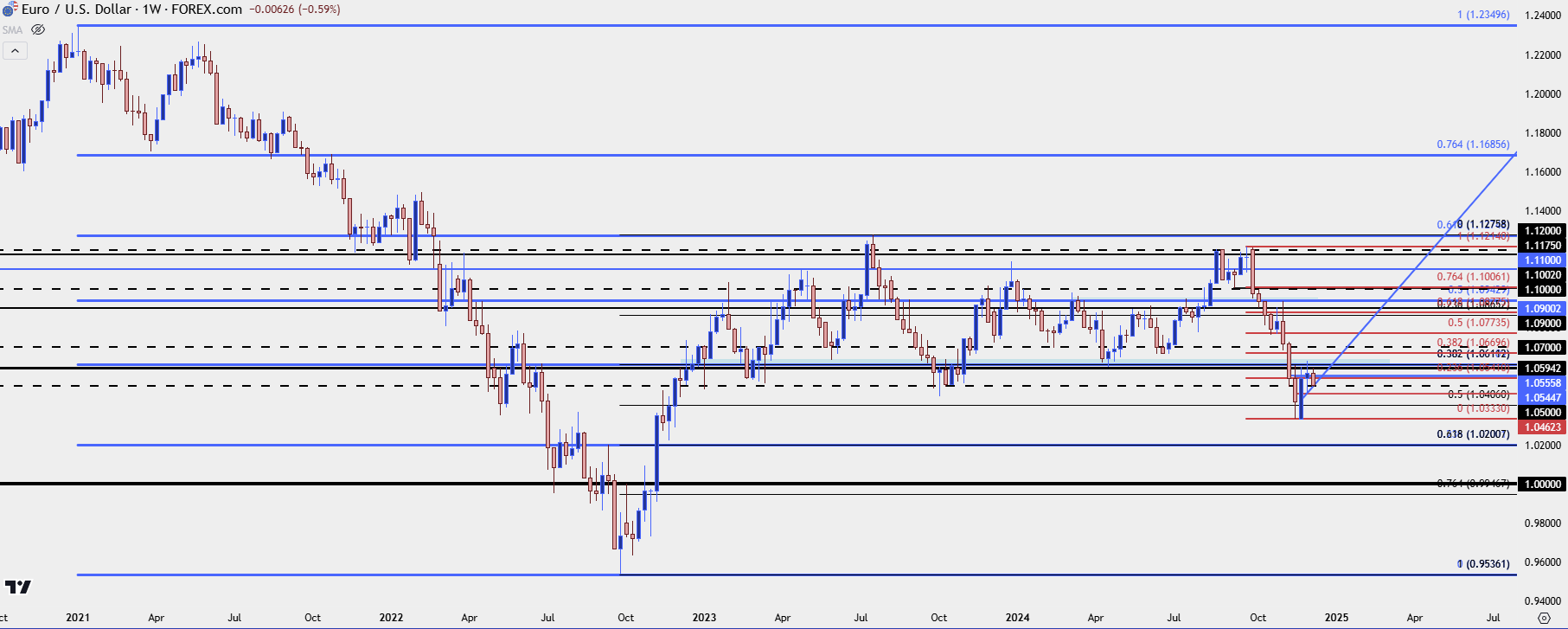 Chart prepared by James Stanley, EUR/USD on Tradingview
Chart prepared by James Stanley, EUR/USD on Tradingview
EUR/USD Shorter-Term
Sellers have continued to defend resistance in EUR/USD but perhaps more notably, they’ve had increasing difficulty in holding price below the 1.0500 level.
The resistance zone I had looked at in last week’s webinar is ultimately what helped to hold the highs on Friday morning at the 1.0611 Fibonacci level, taking place around that NFP print.
At the time of the webinar the 1.0500 level was back in-play and was showing short-term support. There’s also a trendline in here now as taken from the higher-lows that have posted since late-November.
EUR/USD Four-Hour Chart
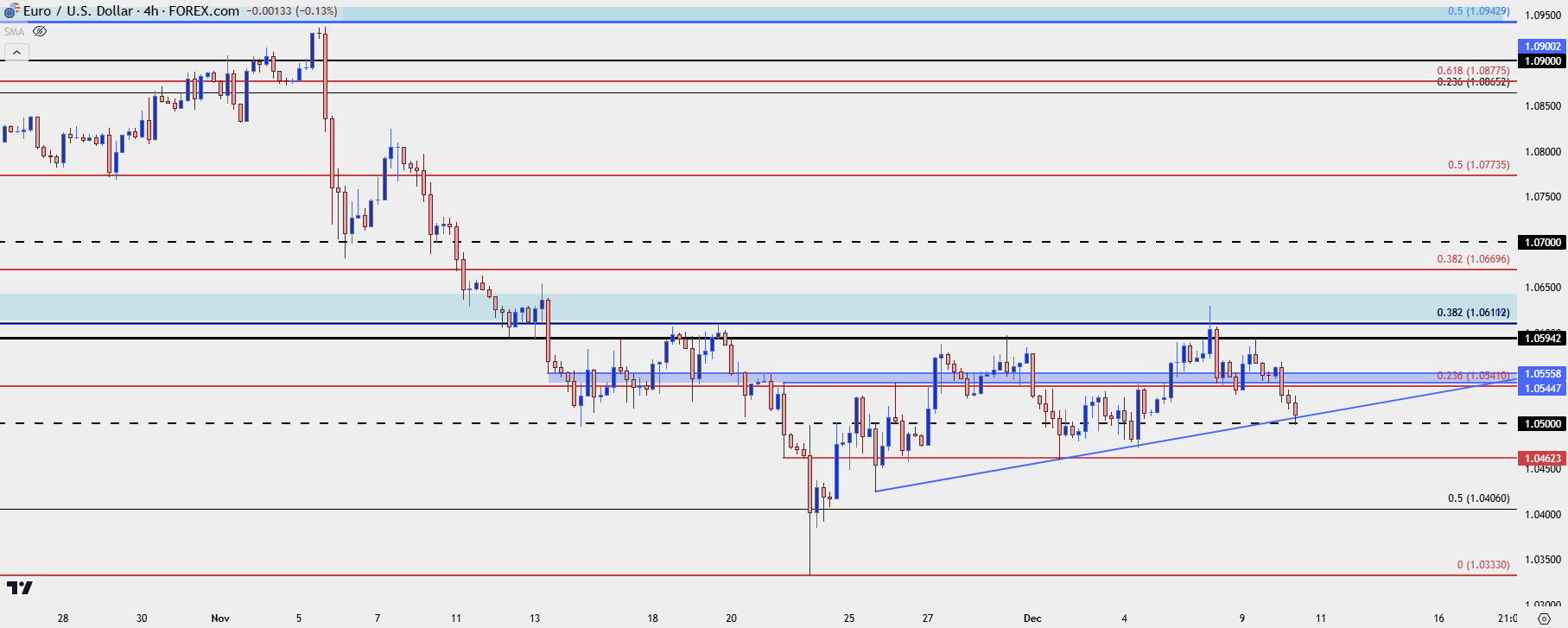 Chart prepared by James Stanley, EUR/USD on Tradingview
Chart prepared by James Stanley, EUR/USD on Tradingview
USD/JPY
With EUR/USD testing support USD/JPY is similarly testing resistance. This is at the 151.95 level that’s also confluent with the 200-day moving average. That’s been a major level in the pair for the past couple years, helping to set highs in 2022 and 2023 before coming in as resistance-turned support in March, April and May of this year.
USD/JPY Weekly Chart
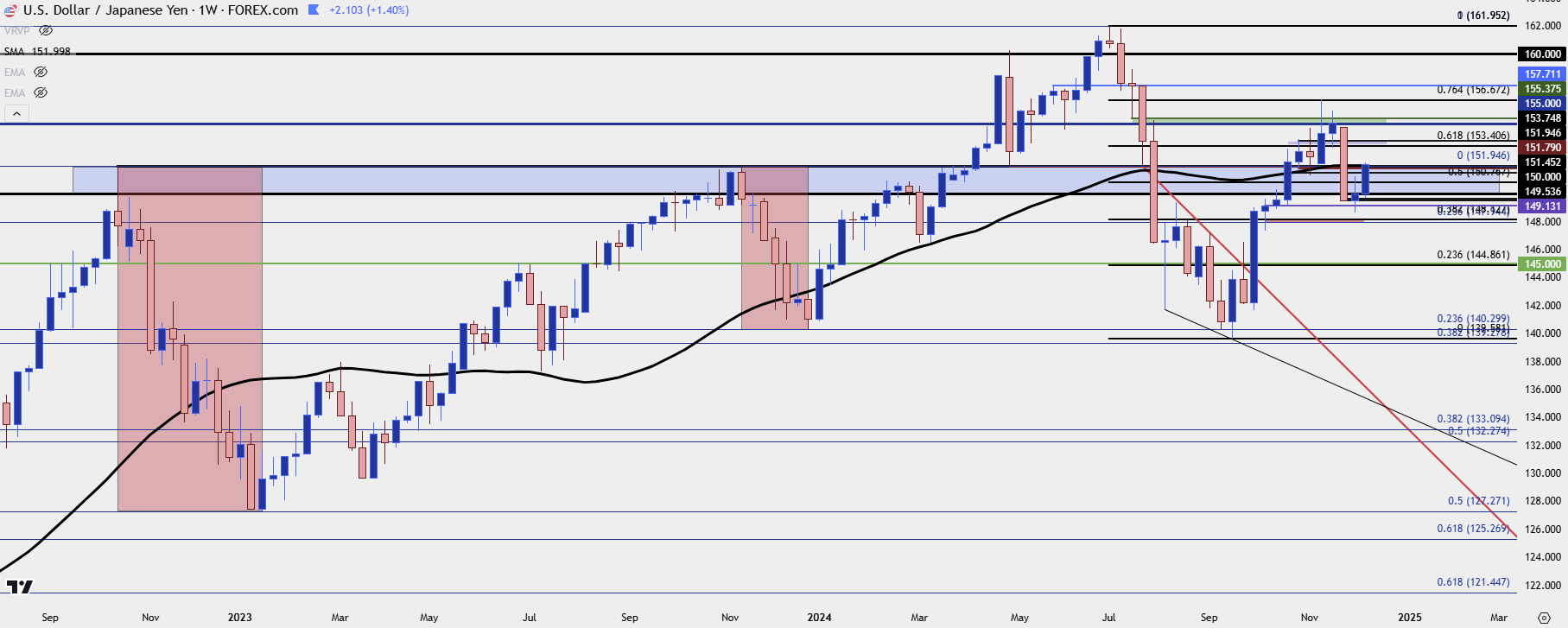 Chart prepared by James Stanley, USD/JPY on Tradingview
Chart prepared by James Stanley, USD/JPY on Tradingview
USD/JPY 150
From the daily we can get some important context: The pair turned quickly in late-November and soon drove below the 150.00 psychological level. But as the door opened into December sellers started to show struggle, unable to hold the pair below the big figure. That soon led to a build of higher-lows and, now with this morning’s test of 151.95, higher-highs, as well.

USD/JPY Daily Chart

USD and Impact from USD/JPY
When the USD went into its aggressive Q3 sell-off, it was very much helped along by unwind of the Yen carry trade. And similarly, as the USD stalled in September and reversed in October, there was a similar theme showing in USD/JPY.
But if we’re going to see the longer-term range hold in DXY which could be helpful to the bullish side of US equities, then we would probably need to see some element of weakness in USD/JPY. And given the BoJ policy review expected after next week’s FOMC rate decision, there would be the potential for such a theme to show. The big question now is whether price action shows that.
At this point the next resistance in USD/JPY is the same support from the descending triangle that broke down a few weeks ago. This is around the 153.41 level, and bulls have control on the four-hour chart given the fresh higher-high to go along with a recent series of higher-lows. For support, 151.45 remains notable, but it’s the 150.77 level that sellers will need to take-out to begin exhibiting control. And of course, below that, continued drive below the 150.00 psychological level that’s stymied sellers so far.
USD/JPY Four-Hour Chart
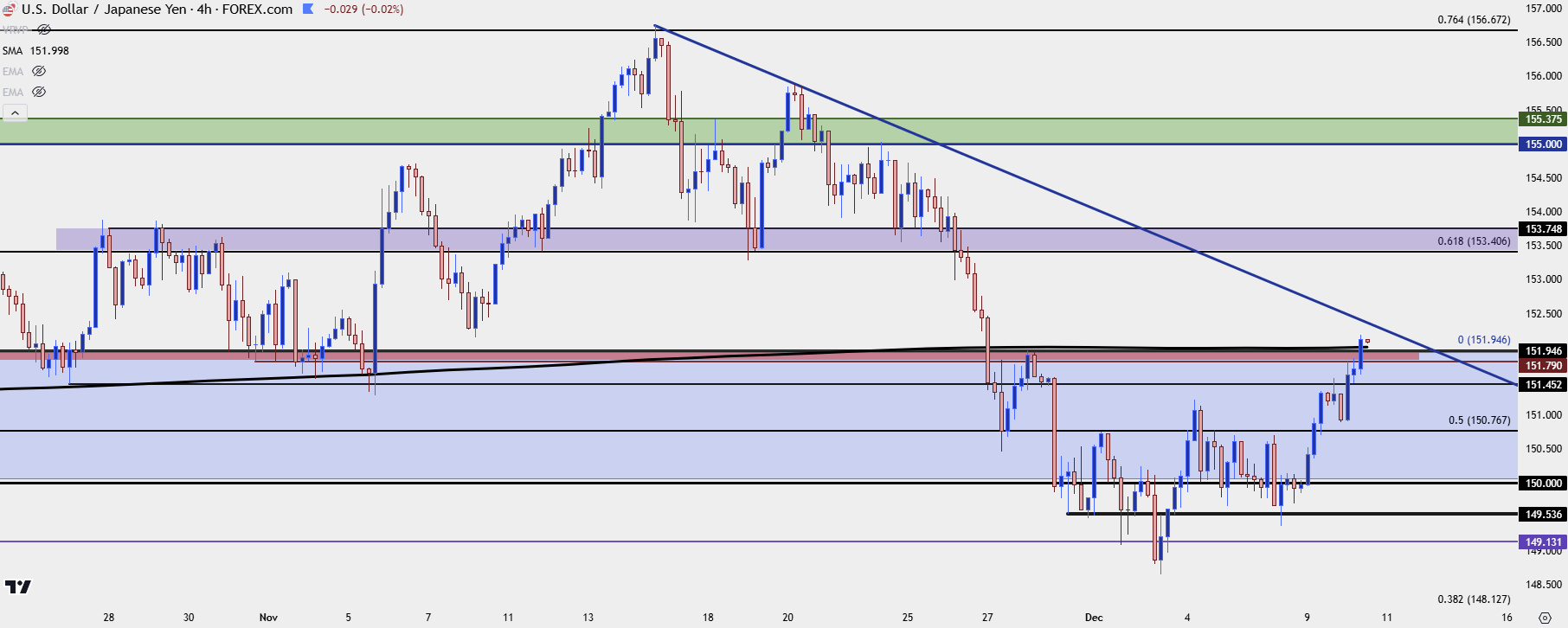 Chart prepared by James Stanley, USD/JPY on Tradingview
Chart prepared by James Stanley, USD/JPY on Tradingview
Gold
Gold was bid strongly for much of the year and finally showed a pullback around the U.S. Presidential Election. In a few weeks the metal wiped out 50% of the June-October rally and that’s around where support started to show in mid-November. The bounce from that found resistance at the 14.4% retracement of the same major move, and the pullback from that resistance held a fairly consistent range for a couple of weeks that I had talked about last Friday.
Gold Daily Chart
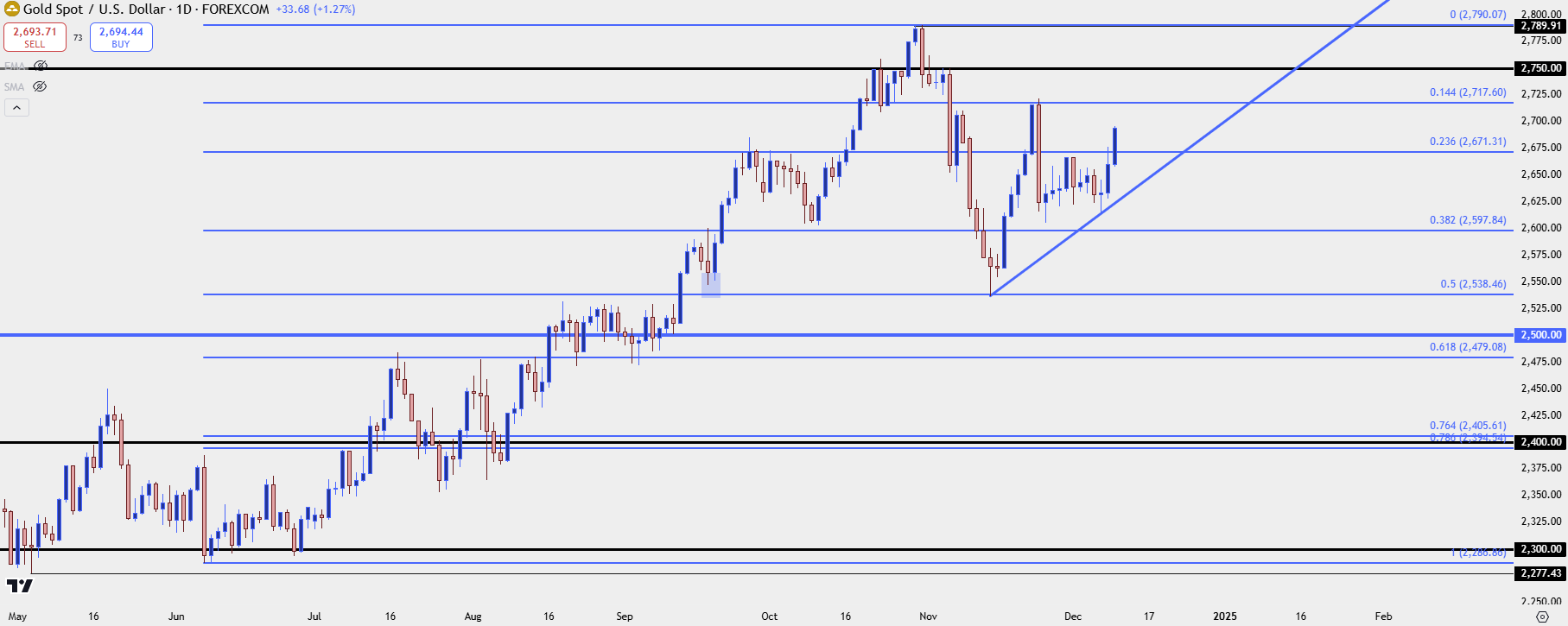 Chart prepared by James Stanley; data derived from Tradingview
Chart prepared by James Stanley; data derived from Tradingview
Gold Range Breakout, Push Towards 2700
When I looked at gold in the webinar last week it was holding range resistance at 2643-2650. The pullback from that had one more test of the 2617-2621 zone, which has since led to the build of a bullish trend.
There’s been continued higher-highs and lows and the next resistance level sitting overhead is the 2700 psychological level. A prior resistance level at 2685 presents support potential, but really it’s the zone from 2671-2675 that is of interest as the former level is related to the above Fibonacci sequence, and the latter a resistance level from yesterday morning.

Gold Four-Hour Chart
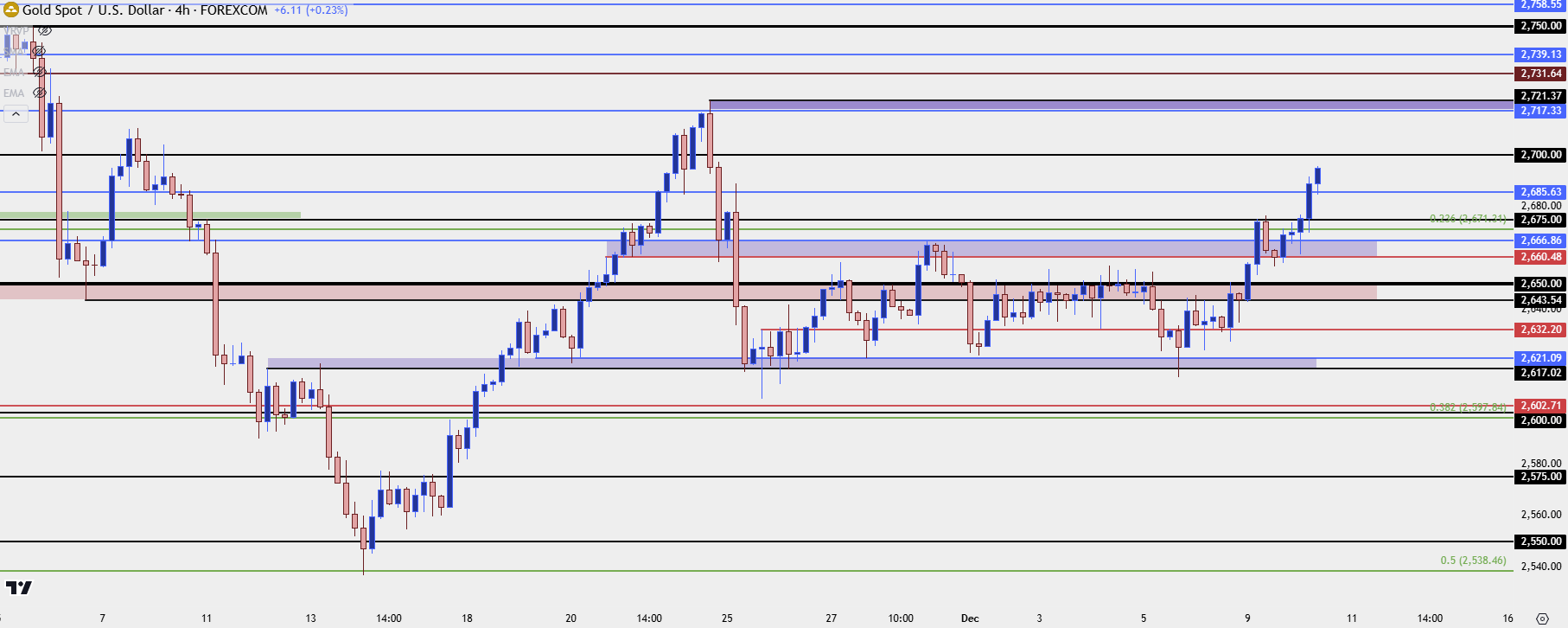 Chart prepared by James Stanley; data derived from Tradingview
Chart prepared by James Stanley; data derived from Tradingview
--- written by James Stanley, Senior Strategist